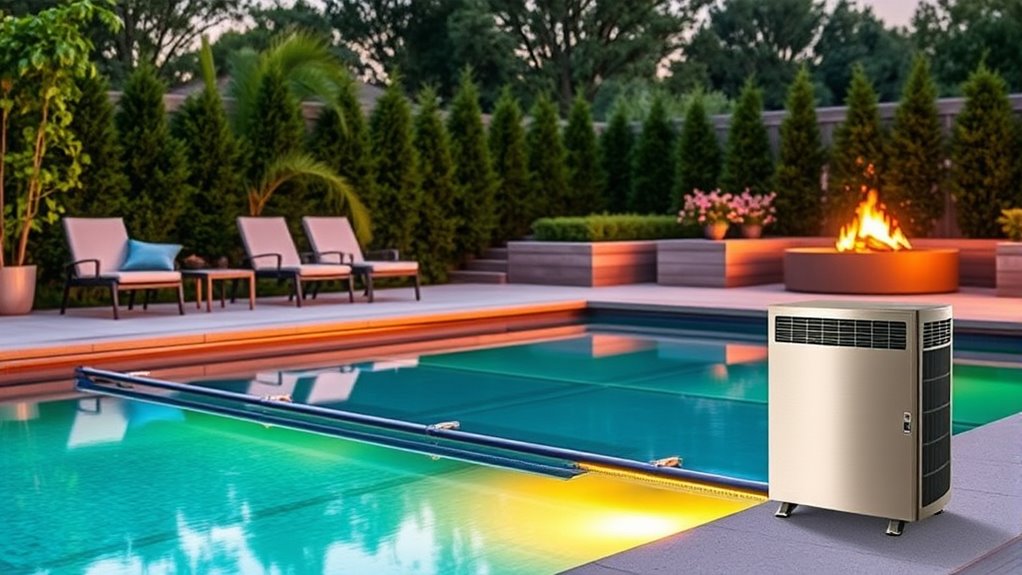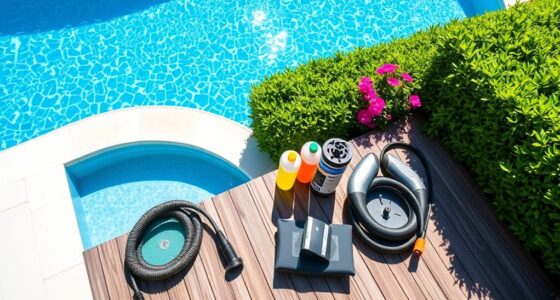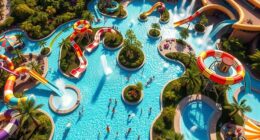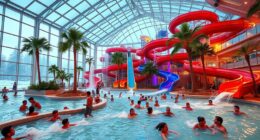To keep your pool warm, you can choose from various options like electric heat pumps, solar heaters, or gas heaters, depending on your climate and budget. Electric and gas systems heat quickly and offer reliable warmth, while solar heaters are eco-friendly and cost-effective if your area gets plenty of sunlight. Proper insulation and covers help conserve heat and extend your swimming season. If you want to explore each option and maximize efficiency, there’s more to discover.
Key Takeaways
- Choose the right heater type (electric, gas, solar, or heat pump) based on climate, budget, and desired heating speed.
- Use pool covers to retain heat, reduce evaporation, and improve energy efficiency year-round.
- Regularly maintain your heating system and monitor chemical balance for optimal performance and longevity.
- Solar heaters and heat pumps offer eco-friendly, cost-effective options with minimal maintenance.
- Safety measures and proper insulation help extend swimming seasons and protect your investment in pool warmth.
Types of Pool Heaters
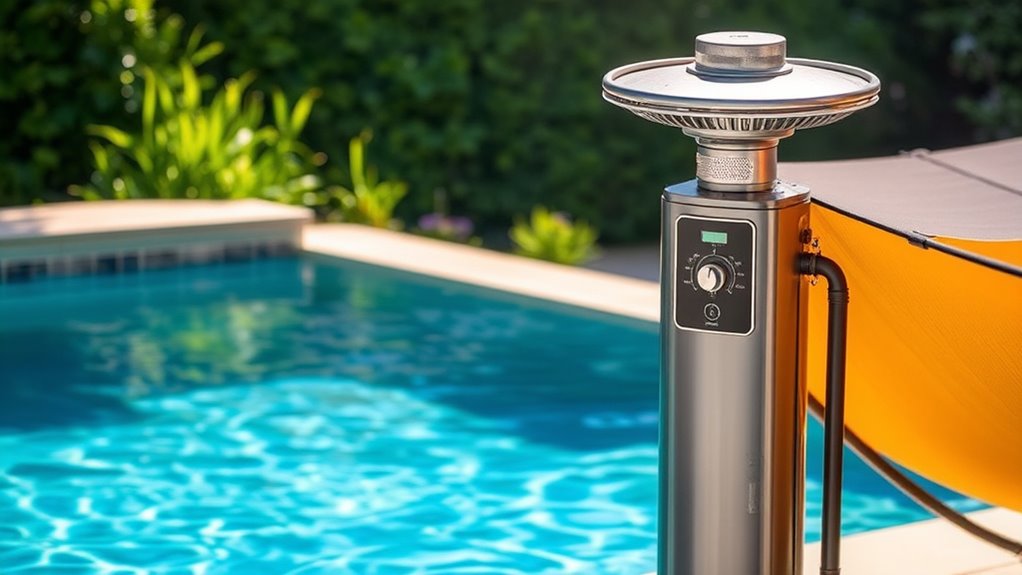
Are you wondering which type of pool heater is best for your needs? There are several options to contemplate, each with unique features. Electric heat pumps are popular because they’re energy-efficient and easy to operate, often paired with pool cover options to retain heat. Solar heaters harness the sun’s power, making them eco-friendly, but they depend on sunlight and require good pool temperature monitoring to ensure consistent warmth. Gas heaters heat water quickly and work well in colder climates, though they may be more costly to run. Understanding how each type interacts with your pool cover options and your ability to monitor and control temperature helps you choose the right heater. Think about your climate, budget, and maintenance preferences to find the best fit.
Gas Pool Heaters
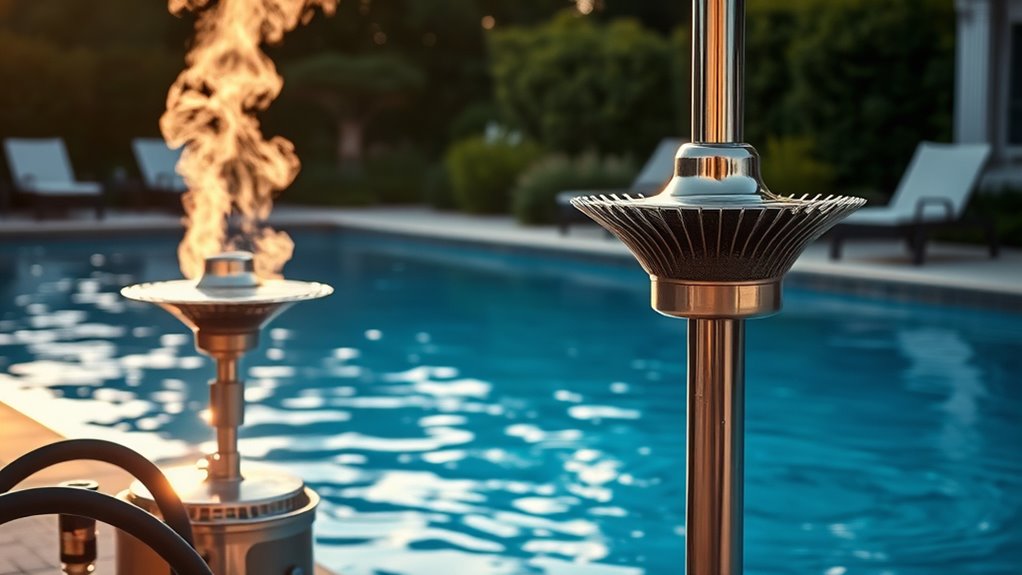
Gas pool heaters are a reliable option for quickly warming your pool, especially when you need to heat it on short notice or in colder weather. They use a gas heater, typically powered by propane heating, to rapidly raise your pool’s temperature. These heaters are efficient and perfect for immediate comfort. Imagine a cozy, warm pool after a chilly day—here’s what fuels that warmth:
| Fuel Type | Heating Speed | Cost Efficiency |
|---|---|---|
| Propane | Very fast | Moderate |
| Natural Gas | Fast | Cost-effective |
| Propane Heating | Quick and reliable | Slightly higher |
With gas heaters, you get quick, consistent warmth, making them ideal for spontaneous swims or extending your swimming season. Understanding the different fuel options can help you choose the best heater for your needs. Additionally, proper maintenance ensures optimal performance and longevity of your heating system.
Electric Pool Heaters

Electric pool heaters use heating elements to warm your water quickly and efficiently. They offer advantages like easy installation and low upfront costs, making them a popular choice. Understanding how they work and their maintenance needs can help you decide if they’re the right option for your pool. Proper temperature regulation is essential to prevent overheating and ensure energy efficiency. Additionally, selecting a portable design can provide flexibility in positioning the heater for optimal performance. Regular inspection of electrical components is also important to maintain safety and prolong the heater’s lifespan. Being aware of potential electrical issues can help prevent unexpected failures and ensure consistent operation. Moreover, staying informed about AI discoveries in related fields can inspire innovative solutions for pool heating technologies.
How Electric Heaters Work
Electric pool heaters work by using electric resistance elements to generate heat directly in the water. When you turn on the heater, electricity flows through metal coils, creating resistance that heats the water passing over them. This process quickly raises your pool’s temperature, allowing you to enjoy warm water even during cooler months. These heaters are designed with safety features to prevent overheating and electrical hazards, ensuring your heater operates safely. Maintaining proper heater safety is essential; always follow manufacturer instructions and regularly inspect the unit. As the resistance elements heat the water efficiently, you can easily control the pool temperature to stay comfortable. Incorporating automatic shut-off features can further enhance safety and energy efficiency during operation. Additionally, choosing models with energy-efficient technology can help reduce your overall operating costs while keeping your pool warm. Using a smart thermostat can optimize heating schedules and improve energy savings. Regular cleaning and descaling of the resistance elements can prolong the lifespan of your heater and maintain optimal performance.
Advantages of Electric Heating
One of the main benefits of electric pool heaters is their energy efficiency, making them a cost-effective choice for maintaining comfortable water temperatures. They convert electricity directly into heat with minimal waste, reducing operational costs over time. Additionally, electric heaters have a lower environmental impact compared to fossil-fuel options, as they produce no emissions during operation. Their compact design allows for easy installation and integration with renewable energy sources, further enhancing eco-friendliness. Electric heating systems can also be easily customized with tuning options to optimize performance for specific pool sizes and user preferences. Proper maintenance and system monitoring can help extend the lifespan and efficiency of electric heaters. Incorporating smart controls can also improve energy management and user convenience, ensuring the system operates at peak efficiency. Modern electric heaters often feature advanced temperature sensors that improve precision and comfort. It is also important to consider cost considerations when choosing an electric heating system to ensure it fits within your budget. Here’s a quick comparison:
| Feature | Electric Heater | Gas Heater | Solar Cover |
|---|---|---|---|
| Energy Efficiency | High | Moderate | Very high (when sunny) |
| Environmental Impact | Low (no emissions) | Higher (emissions) | Zero (solar-based) |
| Operating Costs | Lower over time | Higher | Minimal |
| Installation | Easy | More complex | Simple (but needs sun) |
Maintenance and Efficiency
To keep your electric pool heater running efficiently, regular maintenance is essential. Start by checking your pool’s chemical balance; unbalanced chemicals can cause corrosion and reduce heater lifespan. Clean the filter and strainer regularly to ensure proper water flow and prevent debris buildup that can strain the system. Conduct seasonal maintenance before opening and closing your pool to identify potential issues early. Inspect electrical connections for corrosion or damage, as faulty wiring can impair efficiency and safety. Keep an eye on the thermostat to ensure accurate temperature regulation. Additionally, staying informed about pool chemical management can help prevent issues that affect heater performance. Proper water circulation is vital for consistent heating and to avoid cold spots in your pool. Ensuring proper filter maintenance helps maximize energy efficiency and prolongs equipment life. Regularly checking system components ensures that any minor issues are addressed before they become costly repairs. Incorporating routine inspections can further help identify early signs of wear and tear, ensuring your heater remains in optimal condition.
Solar Pool Heating Systems
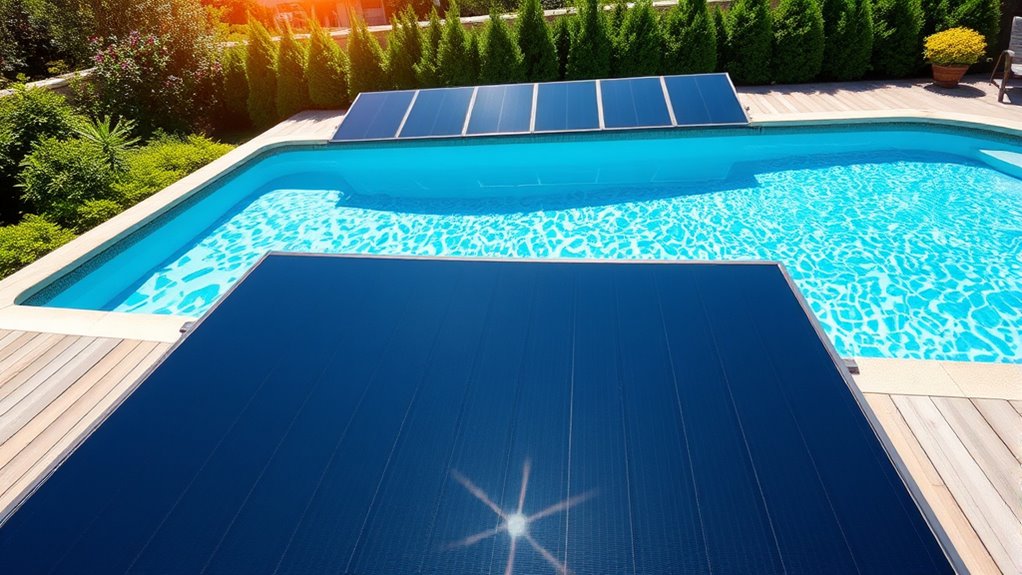
Solar pool heating systems use collectors to capture sunlight and transfer that heat to your pool water. They offer significant benefits like lower operating costs and eco-friendliness. Plus, with proper maintenance, they stay efficient and reliable year after year. Building and maintaining backyard greenhouses can provide additional tips for optimizing solar energy use in various outdoor structures. Additionally, choosing the right water park attractions can enhance your outdoor experience and maximize the benefits of solar-powered systems. Implementing high-quality solar materials can further improve the longevity and efficiency of your heating system, especially when considering energy conservation strategies to reduce overall costs. Incorporating soil enrichment practices can also support the durability of system components by promoting healthier surrounding environments.
How Solar Collectors Work
When sunlight hits solar collectors, they absorb and convert the energy into heat that warms your pool water. The solar collector functioning relies on absorbing solar radiation and transforming it into thermal energy through radiant heat transfer. As sunlight strikes the collector’s dark, insulated surface, it heats the fluid inside, usually water or a water-antifreeze mix. This heated fluid then flows through a system of pipes, transferring heat to your pool water. The process continues as long as there’s sunlight, making solar collectors an efficient, eco-friendly option. They operate silently without moving parts, using radiant heat transfer to maximize energy absorption. This simple yet effective mechanism helps you keep your pool comfortably warm using the sun’s free, renewable energy. Additionally, understanding the trustworthiness of AI technology can assist in optimizing system controls and maintenance.
Benefits of Solar Heating
One of the biggest advantages of solar heating systems is their cost-effectiveness. Once installed, they use free sunlight to warm your pool, markedly lowering your energy bills. Solar panel efficiency has improved over the years, meaning you get more heat from less surface area, maximizing your investment. Plus, solar heating has a minimal environmental impact since it produces no greenhouse gases or pollutants. This eco-friendly option helps you reduce your carbon footprint while maintaining a comfortable swimming temperature. Additionally, solar systems often require less maintenance compared to traditional heaters, saving you time and money in the long run. Overall, solar heating offers a sustainable, budget-friendly way to keep your pool warm without compromising the environment.
Maintenance and Efficiency
Are you wondering how efficient and low-maintenance solar pool heating systems really are? They’re known for their simplicity and eco-friendliness. To keep your system running efficiently, regularly check your pool’s chemical balance, especially pH and sanitizer levels, to prevent algae and equipment damage. Solar heaters require minimal upkeep, usually just occasional cleaning of the panels to remove dirt or debris. Always follow safety precautions when handling cleaning tools or inspecting the system, and avoid stepping on the panels to prevent damage. Unlike traditional heaters, solar systems don’t use gas or electricity constantly, making them cost-effective and environmentally friendly. With proper maintenance and attention to safety, your solar pool heater can keep your pool warm season after season with little hassle.
Heat Pumps for Pools
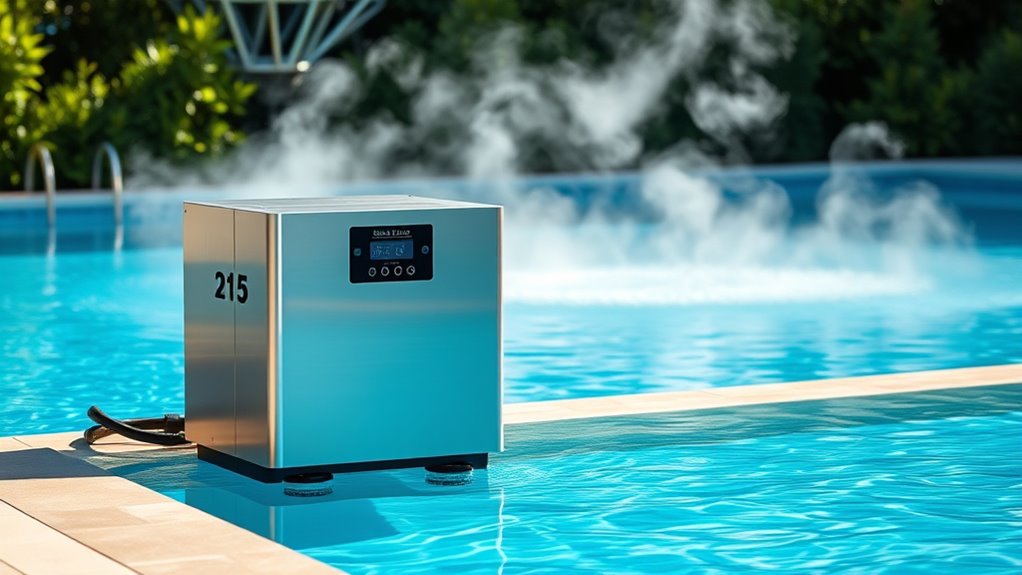
Heat pumps for pools are an efficient and eco-friendly way to maintain your desired water temperature. They use electricity to transfer heat from the air to your pool, making them highly energy-efficient compared to traditional gas heaters. This efficiency not only reduces your energy bills but also minimizes the environmental impact of heating your pool. Because they draw heat from the surrounding air, heat pumps work well even in cooler weather, providing consistent warmth without excessive energy use. Their lower carbon footprint makes them a popular choice for eco-conscious pool owners. Additionally, modern heat pumps operate quietly and require minimal maintenance, ensuring you enjoy a warm pool with less hassle. Overall, they offer a sustainable, cost-effective solution for keeping your pool comfortable year-round.
Choosing the Right Pool Heating System
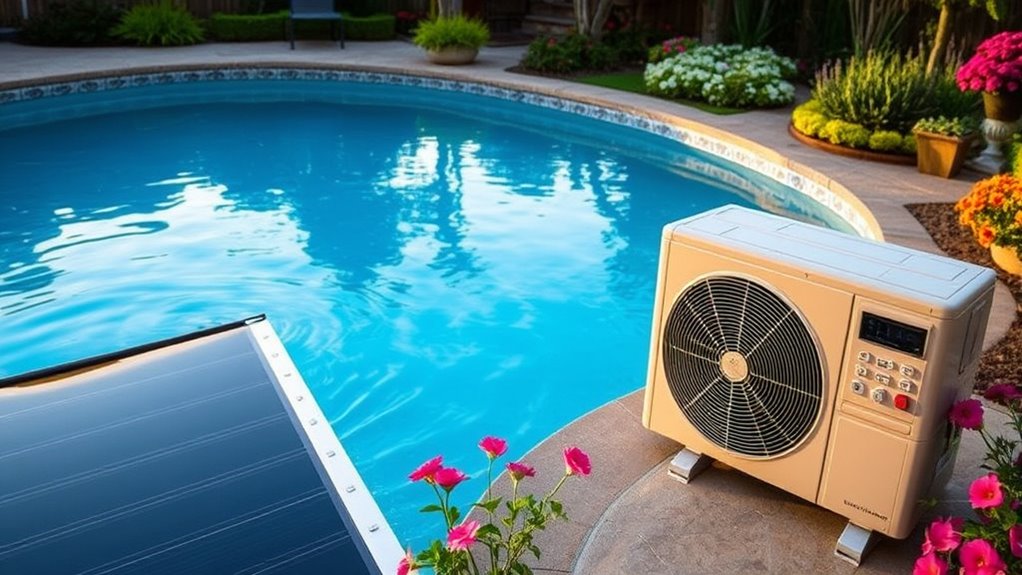
Choosing the right pool heating system depends on your specific needs, budget, and climate. Start by considering pool cover options, as a good cover can reduce heat loss and lower energy costs. If your climate is cooler, you might prioritize efficiency with a heat pump or solar heater, which work well in moderate conditions. For warmer climates, gas heaters provide quick, reliable warming. Keep in mind that the right system also affects chemical balancing; some heaters may impact chlorine levels or pH. Evaluate how often you’ll swim and your maintenance preferences to choose a system that fits your lifestyle. Ultimately, selecting a heater that complements your pool cover choices and supports proper chemical management ensures you enjoy warm water efficiently and comfortably.
Installation and Maintenance Tips
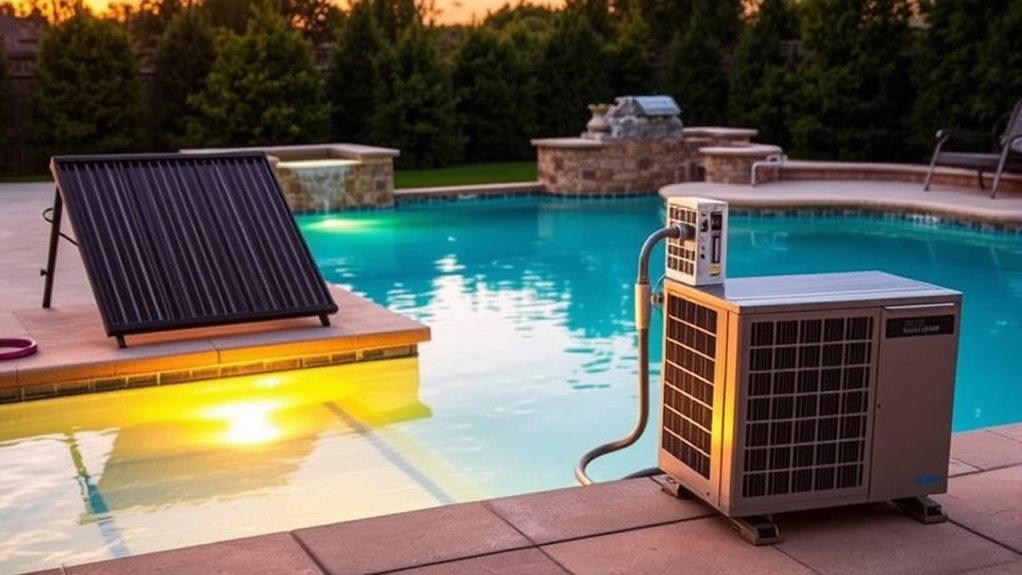
Proper installation and regular maintenance of your pool heating system guarantee it operates efficiently and lasts longer. Always follow manufacturer instructions carefully during installation to ensure safety and peak performance. Keep pool safety in mind by installing proper safeguards around equipment and ensuring electrical connections are secure. Regularly check and maintain proper chemical balancing, as imbalanced water can corrode components and reduce heater lifespan. Clean filters and inspect for leaks or damage to prevent malfunctions. Maintain consistent water flow rates to avoid strain on your system. Scheduling routine inspections helps identify issues early, ensuring safe operation and energy efficiency. By prioritizing proper setup, safety measures, and ongoing maintenance, you’ll extend your heater’s life and enjoy a warm, safe swimming experience.
Cost Considerations and Savings

Considering the initial costs and ongoing expenses is essential when evaluating pool heating options, as they can substantially impact your budget over time. Energy costs play a crucial role in this decision, affecting your monthly bills. While some systems may have higher upfront prices, they often offer better long-term savings through reduced energy consumption. For example, energy-efficient heat pumps or solar heaters might cost more initially but can lower your energy bills considerably over the years. Conversely, cheaper options could lead to higher operating costs, making them less economical long-term. Assessing both the upfront investment and potential energy savings helps you choose a system that balances affordability and efficiency, ultimately making your pool more cost-effective to maintain year-round.
Enhancing Efficiency and Extending Your Swimming Season
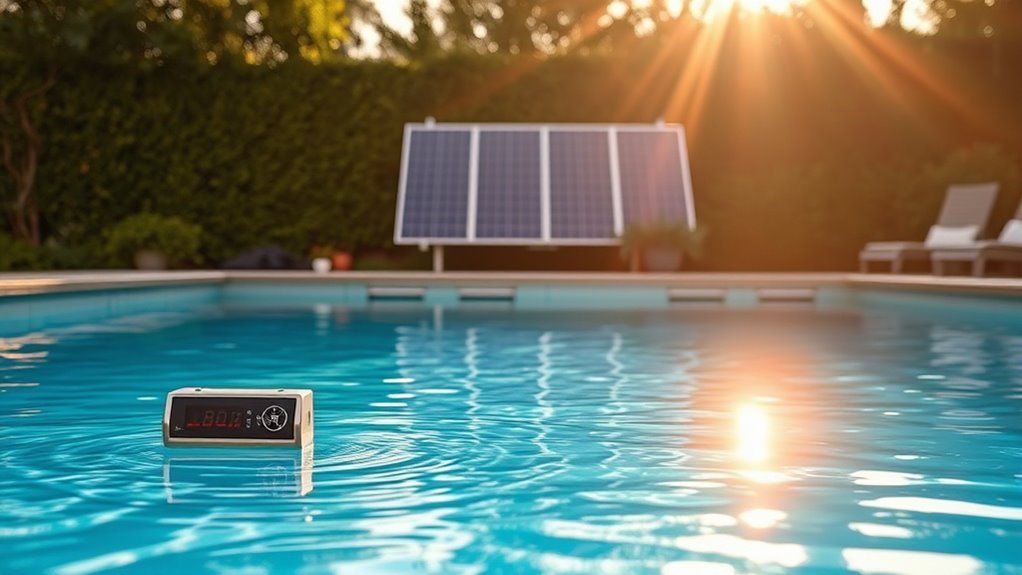
Maximizing your pool’s efficiency can substantially reduce ongoing energy costs and allow you to enjoy your swimming season for longer. To do this, ensure your pool heating system operates at its best by regularly maintaining filters and checking for leaks. Properly managing water chemistry not only keeps your water safe but also improves heater performance, preventing corrosion and scaling. Additionally, cover your pool when not in use to retain heat and reduce evaporation, which conserves energy. Prioritize pool safety by installing appropriate fencing and alarms, especially when extending your season into cooler months. These measures help maintain a consistent, comfortable temperature and protect your investment, making your swimming experience safer and more cost-effective throughout the year.
Frequently Asked Questions
How Long Does It Take to Heat My Pool With Different Systems?
When you ask how long it takes to heat your pool, consider your pool heater sizing and desired temperature. A properly sized heater heats faster—typically 8-12 hours for a full pool. Smaller or less powerful systems may take longer. Once heated, maintaining the temperature is easier with consistent operation. Factors like ambient temperature and pool size influence heating time, so adjust your expectations based on your specific setup.
What Safety Precautions Should I Follow With Pool Heating Equipment?
Oh, the thrill of pool heating safety—because who doesn’t love a shocking surprise? You should always use a pool cover safely to prevent accidents and make certain it’s secure when not in use. Never forget electrical grounding; it’s your best defense against electrocution. Keep all equipment dry and away from water, and regularly check for exposed wires. Safety isn’t just a suggestion, it’s your best way to enjoy your warm pool worry-free.
Can I Upgrade My Existing Pool Heater Later?
Yes, you can upgrade your existing pool heater later. When considering pool heater upgrades, make certain your new heating system is compatible with your current setup. Check the compatibility of your pool’s plumbing, electrical system, and size requirements. Upgrading might involve replacing or modifying parts, so consult a professional to guarantee a smooth transition. This way, you’ll enjoy improved efficiency and better heating performance without major disruptions.
Are There Eco-Friendly Options for Pool Heating?
You’re probably wondering if eco-friendly systems exist for pool heating. The good news is, solar options are a top choice, harnessing sunlight to warm your pool sustainably. These eco-friendly systems reduce energy consumption and emissions, making them a smart, environmentally conscious upgrade. Sun-powered heaters are efficient and cost-effective over time, helping you keep your pool warm while protecting the planet.
How Does Outdoor Climate Affect Pool Heating Efficiency?
Imagine a sunny day, but a strong breeze makes you shiver—outdoor climate really impacts your pool heating. Solar pool heaters work best with consistent sunlight, while wind chill effects can lower water temperature faster, reducing efficiency. Cold winds strip away heat and challenge your heater’s ability to maintain warmth. To optimize, consider windbreaks or choosing heating options suited to your climate, ensuring your pool stays inviting no matter the weather.
Conclusion
Just like Icarus soaring toward the sun, your pool’s warmth depends on choosing the right heater. With the right system, you’ll enjoy extended swim seasons and cozy dips all year round. Remember, proper maintenance keeps your investment shining bright, much like Daedalus’s wings. So, take flight on your pool heating journey, and let every swim feel like a warm embrace from the gods themselves. Plunge in and make every moment memorable.
